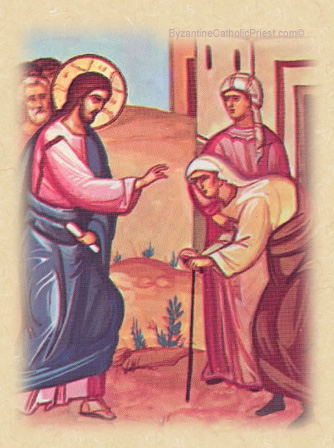True religion vs. self-serving religious practice.Eph. 2:14-22; Luke 13:10-17.* The Twenty-Fourth Sunday after Pentecost, known as the Tenth Sunday of Luke; also, the Feast of the Holy Icon of the Theotokos known as "The Sign." The Tenth Sunday after the Holy Cross; also, the Holy Martyr James the Persian, and our Venerable Father Palladius.
Return to ByzantineCatholicPriest.com. |
11:37 AM 11/27/2011 ó The Gospel lesson of todayís Liturgy shows our Lord doing what he does on several occasions: he performs a cure. But in the context of this cure, because of the criticism of the Rabbi, he has the occasion to use this cure as a means to teach something, in this case, a lesson about true religion vs. self-serving religious practice.  In fact, it is very interesting to note that in very few of our Lordís miracles is he content to do a good deed then walk away. Always with Jesus there is some lesson to be taught, more often then not, a lesson about the true faith or the doctrine of suffering. In fact, it is very interesting to note that in very few of our Lordís miracles is he content to do a good deed then walk away. Always with Jesus there is some lesson to be taught, more often then not, a lesson about the true faith or the doctrine of suffering.
The criticism that our Lord encounters in todayís Gospel, when he heals the crippled woman on the Sabbath, makes this point very well; and itís important that we do not misinterpret our Lordís intent here. It was not his intention to say that it is not important to keep the Sabbath; nor does he lash out at the rabbis at the synagogue because they keep the Sabbath. He takes a stand against them because their keeping of the Sabbath is not consistent: itís hypocritical. They criticize our Lord for curing someone on the Sabbath; but they, themselves, do all kinds of things on the Sabbath, as our Lord points out; and so they contradict themselves. His point is not that itís wrong to follow the rules; his point is that itís wrong to condemn others for not following the rules when we donít follow them ourselves.
For the record, during the three years of his life that are recorded in the Gospel, Jesus did everything that was expected of a devout Jew: he prayed in the synagogue regularly; he kept all the holy days and feasts of the Jewish year; he and his disciples never failed to observe the Sabbath or the annual Passover; he went to the Temple in Jerusalem on the appointed days, and even castigated the woman he met at the well in Samaria for not praying in the Temple. In those few instances in which our Lord seems to be breaking the rulesósuch as today when he heals a woman on the Sabbathóhe is in fact doing what the tradition of the Talmudic rabbis always said, which is to interpret the laws of Moses with the big picture in mind. The devout Jew follows the law of Moses because thatís how he remains faithful to the covenant, not simply to follow the rules because they are important in themselves. This was a point that the rabbis at the synagogue had forgotten; and, in pointing it out to them, our Lord is showing that his fidelity to the law is more perfect than theirs.
We do the same thing all the time. We come to church, we sit there for an hour or so; but do we pray? Some of us do, certainly; but I think itís safe to say that a lot us donít. Iíve known priests who could celebrate divine services in church week after week without praying. Then what happens after church is over? Weíve all known people who could sit in church for an hour, even receive Holy Communion, but arenít out the door fifty feet before theyíre screaming at their spouse or their kids or complaining about someone or something they donít like. Weíve all done this sort of thing from time to time; but when itís a habit, then we have to start asking ourselves, ďWhatís the point?Ē
As Iíve said before, the measure of the quality of what we do here in church is determined by what we do when weíre not here. How well we worship is reflected by how well we live. The rabbis missed that point. For them, keeping the rules became an end unto itself. They were not wrong because they were keeping all the rules. They were wrong because they had forgotten why. Letís try not to make the same mistake ourselves.
Father Michael Venditti
* Due to the "Lucan Jump," the Gospel read today is that for the 27th Sunday after Pentecost. Cf. the note appended to the Fifteenth Sunday after Pentecost.
|

